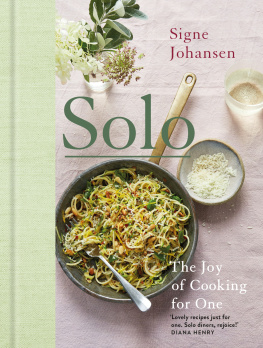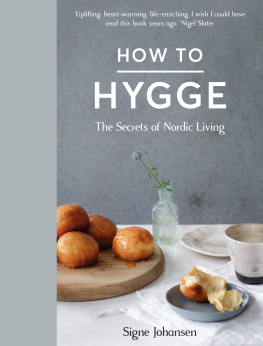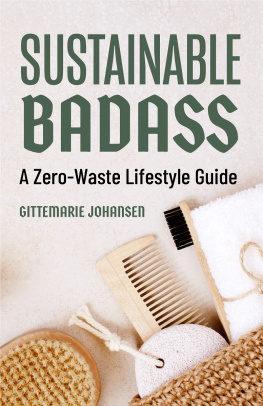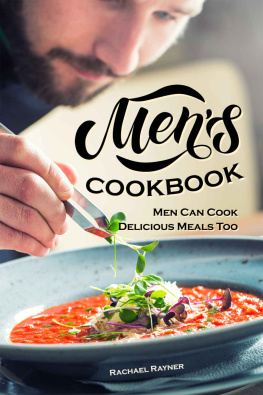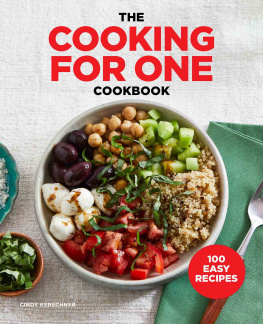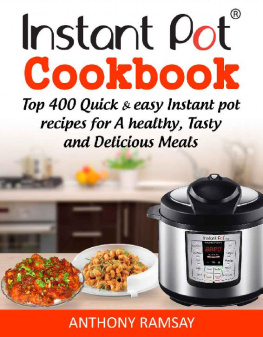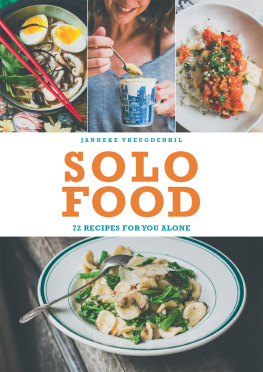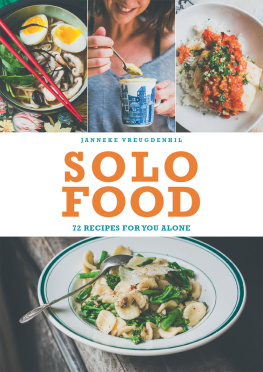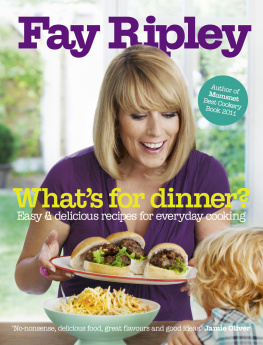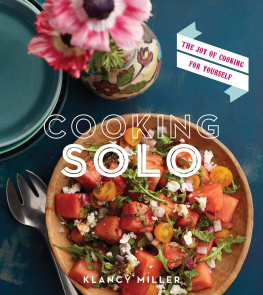Introduction

Cooking is social. Or is it?
Lets be honest here, no one aspires to be a solo cook. Conventional wisdom cleaves to the notion that cooking is an inherently social act: recipe books often advise that a dish serves 4 or 6 people; cookery programmes on television and stylish social media accounts show us how to achieve a thoroughly modern ideal of easy, breezy conviviality. We set the table when guests come round. Candles are lit, bottles are opened, the right playlist is selected. Oddly, cooking solo just isnt seen as terribly worthwhile.
Why bother cooking when Im alone? you ask. Yet consider an alternative view: much like a restorative afternoon nap, or a few hours doing something creative, such as drawing or playing an instrument, cooking solo can be one of lifes simplest and most therapeutic pleasures. Honestly, as much as I love cooking for others, I derive so much joy from time spent tinkering on my own in the kitchen. Ill set the table, light a candle, perhaps open a bottle of wine while cooking and have a playlist on the go just for me! Cooking as a social act may well be idealised, but the reality is it can sometimes feel like an exhausting performance, even for the experienced cook. When freed of the need to make polite chit-chat, having shed the burden to perform a dazzling culinary cabaret for friends, or worse, of trying to impress someone important with my cooking skills, I dont have to worry any more. I can be as slapdash, creative and relaxed in the kitchen as I want. Cooking for yourself is both fun and immensely liberating. Whats not to love about that?
A space to be a dork in
Truth be told, the kitchen is a space where I can just be who I have naturally been since my teens: an introverted geek who spends hours exploring the science of baking bread, or experiments with whatever is in the cupboard. Sport and cooking were two activities which really saved me as a teenager, and theyve kept me grounded ever since.
Im certainly not the first to have recognised the therapeutic properties of time spent in the kitchen: Irish novelist Marian Keyess book, Saved by Cake, is an honest account of how baking helped alleviate her anxiety and depression. I would add that knowing how to cook and bake a few things are essential life skills that help you establish self-reliance, not to mention self-confidence. The kitchen is a space where I can totally decompress, where I can dance like a happy dork, make a complete mess and accidentally set fire to the occasional tea towel in my exuberance of just being alone, with no distractions. As an adult I still view time spent solo in a kitchen as a source of childlike glee: I can play, I can make mistakes, I can do whatever the hell I want. Its the ultimate in me time and I relish every minute of it.
Ive lost track of the number of times Ive come back from a day of work and meetings, kicked off my shoes, and smiled to myself at the prospect of rustling up a simple meal. Mixing a whisky soda, Ill flick through my list of unplayed podcasts: mood depending, Ill put on the BBC Food Programme to learn about the art of fermentation, or switch on Freabonomics and discover why shoes are killing our feet. The New Yorker Radio Hour podcast is a constant source of thoughtful conversation, and a welcome respite on days when the news is dispiriting. If Im due a trip abroad Ill tune in to a few language lessons, flamboyantly repeating foreign words out loud, safe in the knowledge that no one can hear me, let alone laugh at my goofy pronunciation. No one is there to raise an eyebrow at the sight of a singed tea towel resting on my apron. I can add as much garlic and chilli to a dish as I damn well please.

Unlike the culinary wizardry you might typically see on TV and the glossy, highly filtered images in cookery books or on social media, my baking and cooking skills are closer to what the Swedish Chef performs on the The Muppet Show (Ive made experimental casseroles that tasted like penance for a crime committed in a previous life). The reason why I share this with you is in the hope that youll understand that being a solo cook has nothing to do with perfection, or a romanticised image of domestic bliss. There are times when I cant bear the thought of cooking, so I grab a tin of soup from the corner shop. Hummus and carrot sticks have also been a reliable standby and I dont always bake my own bread. I make compromises, I take shortcuts, I resort to the path of least resistance. In an age when were bombarded with fundamentalist diktats about sustainable eating, clean eating and the supposedly life-saving importance of cooking everything from scratch let me assure you: being pragmatic is essential to any cooks sanity, not just a solo one.
Consequently, this book is the culmination of nearly three decades of lived experience, a decade of working in the hospitality industry and what Ive learnt from family, friends and wise colleagues. I was fortunate to grow up in a family who love food, and cooking from an early age became a portal to another world. All those hours spent solo in the kitchen was not only time well spent, but it also helped me reset when school, work or just life in general became stressful. It was and still is the perfect place to soothe an ailing spirit.
Consider Solo: The Joy of Cooking for One as a sisterly companion, a book that celebrates those moments when you make the time to cook a simple dish for yourself. As Nigel Slater once wrote: Cooking for yourself is simply a matter of self-respect an act of kindness to yourself, that nourishes both mind and body. So, rather than asking why you should bother cooking for yourself, try reframing your thinking: start with the assumption that looking after yourself is an essential act of kindness, and suddenly cooking a few simple dishes doesnt seem like such a chore. Its rewarding, meaningful and can be fun. If using even one recipe in this book brings you a smidgeon of joy then my job is done.
A good cook stocks up
While resorting to a ready meal is hardly a moral failing, rare is the occasion when Ive stood in a supermarket aisle and had a culinary epiphany: Why yes, tonight I shall cook a classic duck confit all for myself! Its a fine idea in principle, but given that I cant remember half the ingredients and the cookbook is at home Im usually stymied. Not to mention that the duck really needed to be slowly confit-ing itself since sometime around breakfast that day...
So if youre a novice cook, consider this my most useful advice to you: a good cook always has a well-stocked store-cupboard or larder (or whatever you want to call it). Why? It means you can grab ingredients on the run perhaps a source of protein and greens or herbs and cook something simple using a handful of condiments, spices, pastes. In other words: the odds and sods you have already in the kitchen. It really pays to be prepared, but also to think like a chef who has to make the most of ingredients available: do the occasional inventory of whats in your kitchen and that way youll waste less. See my suggestions for stocking up on store-cupboard goods and fresh supplies .

